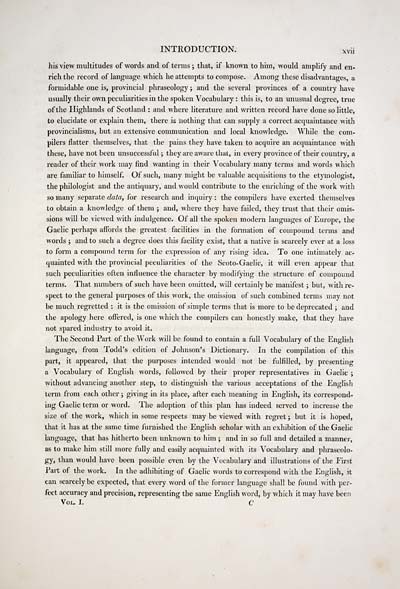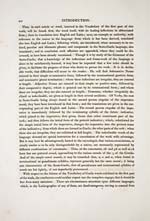Download files
Complete book:
Individual page:
Thumbnail gallery: Grid view | List view

INTRODUCTION. xvii
his view multitudes of words and of terms ; that, if known to him, would amplify and en-
rich the record of language which he attempts to compose. Among these disadvantages, a
formidable one is, provincial phraseology ; and the several provinces of a country have
usually their own peculiarities in the spoken Vocabulary : this is, to an unusual degree, true
of the Highlands of Scotland : and where literature and written record have done so little,
to elucidate or explain them, there is nothing that can supply a correct acquaintance with
provincialisms, but an extensive communication and local knowledge. While the com-
pilers flatter themselves, that the pains they have taken to acquire an acquaintance with
these, have not been unsuccessful ; they are aware that, in every province of their country, a
reader of their work may find wanting in their Vocabulary many terms and words which
are familiar to himself. Of such, many might be valuable acquisitions to the etymologist,
the philologist and the antiquary, and would contribute to the enriching of the work with
so many separate data, for research and inquiry : the compilers have exerted themselves
to obtain a knowledge of them ; and, where they have failed, they trust that their omis-
sions will be viewed with indulgence. Of all the spoken modern languages of Europe, the
Gaelic perhaps affords the greatest facilities in the formation of compound terms and
words ; and to such a degree does this facility exist, that a native is scaicely ever at a loss
to form a compound term for the expression of any rising idea. To one intimately ac-
quainted with the provincial peculiarities of the Seoto-Gaelic, it will even appear that
such peculiarities often influence the character by modifying the structure of compound
terms. That numbers of such have been omitted, will certainly be manifest ; but, with re-
spect to the general purposes of this work, the omission of such combined terms may not
be much regretted : it is the omission of simple terms that is more to be deprecated ; and
the apology here offered, is one which the compilers can honestly make, that they have
not spared industry to avoid it.
The Second Part of the Work will be found to contain a full Vocabulary of the English
language, from Todd's edition of Johnson's Dictionary. In the compilation of this
part, it appeared, that the pui-poses intended would not be fulfilled, by presenting
a Vocabulary of English words, followed by their proper representatives in Gaelic ;
without advancing another step, to distinguish the various acceptations of the English
term from each other ; giving in its place, after each meaning in English, its correspond-
ing Gaelic term Or word. The adoption of this plan has indeed served to increase the
size of the work, which in some respects may be viewed with regret ; but it is hoped,
that it has at the same time furnished the English scholar with an exhibition of the Gaelic
language, that has hitherto been unknown to him ; and in so full and detailed a manner,
as to make him still more fully and easily acquainted with its Vocabulary and phraseolo-
gy, than would have been possible even by the Vocabulary and illustrations of the First
Part of the work. In the adhibiting of Gaelic words to correspond with the English, it
can scarcely be expected, that every word of the former language shall be found with per-
fect accuracy and precision, representing the same English word, by which it may have been
Vol. I. c
his view multitudes of words and of terms ; that, if known to him, would amplify and en-
rich the record of language which he attempts to compose. Among these disadvantages, a
formidable one is, provincial phraseology ; and the several provinces of a country have
usually their own peculiarities in the spoken Vocabulary : this is, to an unusual degree, true
of the Highlands of Scotland : and where literature and written record have done so little,
to elucidate or explain them, there is nothing that can supply a correct acquaintance with
provincialisms, but an extensive communication and local knowledge. While the com-
pilers flatter themselves, that the pains they have taken to acquire an acquaintance with
these, have not been unsuccessful ; they are aware that, in every province of their country, a
reader of their work may find wanting in their Vocabulary many terms and words which
are familiar to himself. Of such, many might be valuable acquisitions to the etymologist,
the philologist and the antiquary, and would contribute to the enriching of the work with
so many separate data, for research and inquiry : the compilers have exerted themselves
to obtain a knowledge of them ; and, where they have failed, they trust that their omis-
sions will be viewed with indulgence. Of all the spoken modern languages of Europe, the
Gaelic perhaps affords the greatest facilities in the formation of compound terms and
words ; and to such a degree does this facility exist, that a native is scaicely ever at a loss
to form a compound term for the expression of any rising idea. To one intimately ac-
quainted with the provincial peculiarities of the Seoto-Gaelic, it will even appear that
such peculiarities often influence the character by modifying the structure of compound
terms. That numbers of such have been omitted, will certainly be manifest ; but, with re-
spect to the general purposes of this work, the omission of such combined terms may not
be much regretted : it is the omission of simple terms that is more to be deprecated ; and
the apology here offered, is one which the compilers can honestly make, that they have
not spared industry to avoid it.
The Second Part of the Work will be found to contain a full Vocabulary of the English
language, from Todd's edition of Johnson's Dictionary. In the compilation of this
part, it appeared, that the pui-poses intended would not be fulfilled, by presenting
a Vocabulary of English words, followed by their proper representatives in Gaelic ;
without advancing another step, to distinguish the various acceptations of the English
term from each other ; giving in its place, after each meaning in English, its correspond-
ing Gaelic term Or word. The adoption of this plan has indeed served to increase the
size of the work, which in some respects may be viewed with regret ; but it is hoped,
that it has at the same time furnished the English scholar with an exhibition of the Gaelic
language, that has hitherto been unknown to him ; and in so full and detailed a manner,
as to make him still more fully and easily acquainted with its Vocabulary and phraseolo-
gy, than would have been possible even by the Vocabulary and illustrations of the First
Part of the work. In the adhibiting of Gaelic words to correspond with the English, it
can scarcely be expected, that every word of the former language shall be found with per-
fect accuracy and precision, representing the same English word, by which it may have been
Vol. I. c
Set display mode to: Large image | Transcription
Images and transcriptions on this page, including medium image downloads, may be used under the Creative Commons Attribution 4.0 International Licence unless otherwise stated. ![]()
| Early Gaelic Book Collections > Blair Collection > Dictionarium scoto-celticum > Volume I > (23) |
|---|
| Permanent URL | https://digital.nls.uk/76575830 |
|---|
| Description | Lacks half title page in Volume 1. |
|---|---|
| Attribution and copyright: |
|
| Description | A selection of books from a collection of more than 500 titles, mostly on religious and literary topics. Also includes some material dealing with other Celtic languages and societies. Collection created towards the end of the 19th century by Lady Evelyn Stewart Murray. |
|---|
| Description | Selected items from five 'Special and Named Printed Collections'. Includes books in Gaelic and other Celtic languages, works about the Gaels, their languages, literature, culture and history. |
|---|

